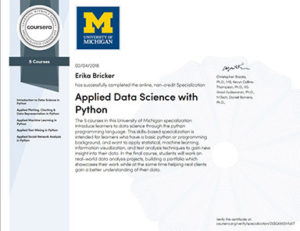I’m very happy to say that I finally completed my certificate for Applied Data Science with Python, a 5-course specialization by University of Michigan on Coursera. Although it was five courses and many late nights spent struggling with assignments, I still feel as though I’ve only scratched the surface on the subject of Data Science. Still, it’s a foundation to build on.
This was my first experience with a MOOC, so I’d like to share some thoughts.
These courses were definitely not for beginners even though the first course was an “Intro” course. To University of Michigan’s credit, they did warn us that some background in Python was expected. If you’re thinking about taking something like this on and do not already have a background in data science specifically, I’d recommend building a firm background in Python first, especially with libraries such as Pandas, Matplotlib and Numpy, for starters. You will also have to be comfortable with self-teaching and using forums for help because the instructors  are really only there to occasionally answer questions in the forums and to make sure the platform is running the way it should. Other than that, you’re on your own.
are really only there to occasionally answer questions in the forums and to make sure the platform is running the way it should. Other than that, you’re on your own.
I unwittingly started this specialization as it was being developed, so I and some of my fellow students had to wait in between courses for them to be ready before continuing on to the next course. Some of their expected dates for courses had to be moved back from what was originally posted. Some people were upset at the delays because they had set goals to be done within a certain time frame. There were some indications that some of the courses and assignments were put together a little too quickly. The visualization course in particular wasn’t great. The assignments didn’t seem to have anything to do with the lectures in some cases. I also wasn’t crazy about the peer reviewed format of that course. It often took a long time to get a grade and and when I had to grade others, I was not always comfortable doing so because we had different interpretations of the assignment.
Four out of five of the courses used an autograder, which was nice for instant feedback. The downside of using an autograder is that it doesn’t give you any feedback on the quality of your code. It can only tell you if you got the answer it was expecting – it won’t tell you if your code was elegant or efficient (unless of course your code is so bad the autograder can’t run it). The forums and my fellow students were often a huge help and I spent a lot of time reading documentation and searching StackOverflow for nuggets of wisdom.
Still, I think it was a really good experience especially for someone like me who is not going to spend thousands of dollars to go back to school for another advanced degree, but would like some exposure to the field of data science. Beyond the few negatives I mentioned previously, the overall specialization content was good, the instructors were knowledgeable, and the courses gave me something solid to build on. Now, I just need to decide what to tackle next.
Find me here:
